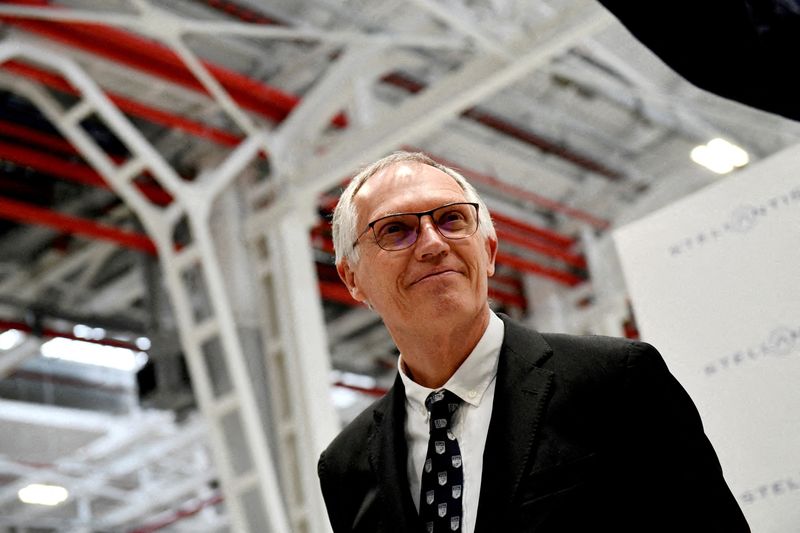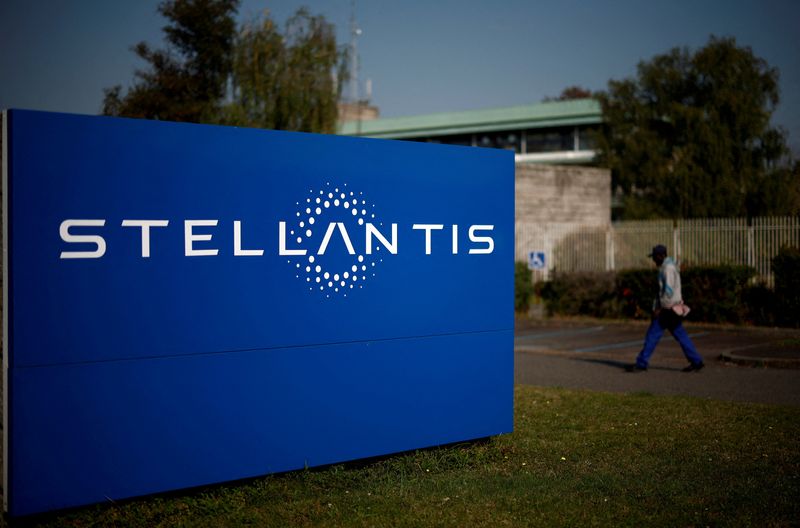By Nora Eckert
DETROIT (Reuters) -Chrysler parent Stellantis (NYSE:STLA) confirmed on Thursday that CEO Carlos Tavares would retire at the end of his contract in early 2026 and announced major senior management changes as it struggles to turn around its lagging North American operations.
Earnings and sales in the French-Italian automaker's traditional profit powerhouse have been declining, forcing it to last week cut its 2024 profit forecast and signal possible reductions to its dividend and share buybacks next year.
Analysts have downgraded the company's stock, which has tumbled 42% this year after missteps in North America, where sales of popular products such as its Jeep and Ram trucks typically produce much of its profits.
The confirmation of Tavares' retirement plans comes weeks after Stellantis said it was searching for his successor, though at the time it said it was possible he could remain after his contract expires. The world's fourth-largest automaker by sales said it now planned to name his successor by the fourth quarter of 2025.
Stellantis appointed Doug Ostermann, the former chief operating officer of its China division, as its finance chief, replacing Natalie Knight who is leaving the company.
The automaker also appointed Antonio Filosa as its North America chief operating officer in addition to his role as Jeep brand CEO, succeeding Carlos Zarlenga, whose future role has not been announced.
Tavares, an avid race car driver who was widely heralded in prior years for making Stellantis one of the world's most profitable automakers, has led the company since its creation through a 2021 merger between Fiat-Chrysler and Peugeot (OTC:PUGOY) maker PSA, where he had been board chair since 2014.
But the company's bloated inventories and profit nosedive in recent months have shocked industry observers after years of its sizable margins being the envy of competitors in Detroit and abroad.
"After dismissing investors' concerns on inventories and discounts in the US for the better part of the past 12 months, the company lost significant trust when they cut guidance in late September," Bernstein analysts said in a note.
"Today’s management reshuffle adds to a growing list of senior management changes (21 in the last 12 months) and will likely be unable to calm investors’ nerves," they added.
Stellantis last week lowered its forecast from positive cash flow to negative cash flow of between 5 billion and 10 billion euros ($5.5 billion-$10.9 billion) this year.
Tavares had previously maintained that the group's 14 brands, including Maserati, Fiat, Peugeot and Jeep were all assets to Stellantis' portfolio, but in July said poor performers could be axed to cut costs.
He is racing against formidable competition from Chinese electric vehicle makers that are gaining market share in Europe, and said in order to beat these rivals, Stellantis has "to try to be Chinese ourselves."
Stellantis is chasing a steep ramp-up in sales of its electric models, aiming for 100% of its passenger car sales to be electric in Europe by 2030 and 50% of its passenger cars and light-duty trucks in the U.S. to be EVs by then. The company plans to offer 75 electric models globally in that timeframe.
As the automaker attempts to sharpen its strategy and improve its financial position, Tavares has faced harsh criticism from the United Auto Workers union, dealers and shareholders.
The broad management shakeup was meant to address these concerns, he said in a statement Thursday.
"During this Darwinian period for the automotive industry, our duty and ethical responsibility is to adapt and prepare ourselves for the future," he added.
In addition to the management changes, Stellantis is also shaking up its structure by moving the supply chain organization to the manufacturing division in an effort to provide more attention to improving performance among its suppliers.
When asked for comment, a representative for the UAW sent a link to a union website picturing Tavares in a trash can, on top of a list of the labor group's critiques of him.

The union is laying the groundwork for a nationwide walkout against the automaker, alleging it had failed to keep the commitments it made in last year's contract signed after a six-week strike that cost it about 750 million euros in profit.
($1 = 0.9146 euros)
